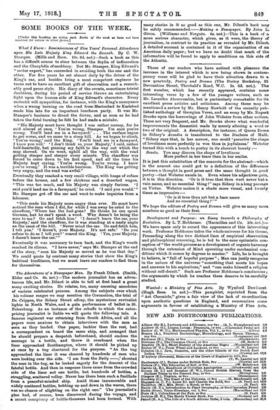The Adventures of a Newspaper Man. By Frank Dilnot. (Smith,
Elder and Co. 6s. net.)—The modern journalist has an adven- turous life, and Mr. Dilnot is able to tell at first hand a great many exciting stories. He relates, too, many amusing anecdotes of various celebrated persons. Among the subjects over which his volume ranges wo may mention the Coronation, the trial of Dr. Crippen, the Sidney Street affray, the mysterious revivalist lights in North Wales, and a gala performance of ballet in St. Petersburg. As an instance of the rebuffs to which the enter- prising journalist is liable we will quote the following tale. A famous regiment was returning from South Africa, and all the papers were anxious to obtain interviews with the men as soon as they landed. One paper, luckier than the rest, had a correspondent on board the same ship, and arranged that he should prepare a despatch beforehand, should enclose the message in a bottle, and throw it overboard when the liner approached Southampton, where it should be picked up at once by a tug chartered for the purpose. "As the tug approached the liner it was cheered by hundreds of men who were looking over the side. 'I am from the Daily —,' shouted the man in the tug, as he looked eagerly for the descent of the fateful bottle. And then in response there came from the crowded side of the liner not one bottle, but hundreds of bottles, a straggling, scattered volley. Never has there been such a fusillade from a peaceful-minded ship. Amid those innumerable and widely scattered bottles, bobbing up and down in the waves, there was no chance of alighting on the right one." The journalist's plan had, of course, been discovered during the voyage, and a secret conspiracy of bottle-throwers had been formed. With many stories in it as good as this one, Mr. Dilnot's book may be safely recommended.—Making a Newspaper. By John L. Given. (Williams and Norgate. Gs. net.)—This is a book of a. more serious character, which gives, as it were, the theory of journalism, in contrast to its practice as revealed by Mr. Diktat. A detailed account is contained in it of the organization of an American daily paper; but we have no doubt that much of the information will be found to apply to conditions on this side of the Atlantic.










































 Previous page
Previous page